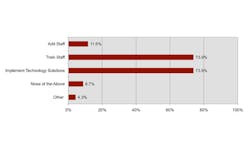Supply Chain & Logistics: Best Practices for Global Shipping Compliance
For manufacturers, managing a global supply chain often begins (and sometimes ends) with complying with 600 or more different laws and regulations that go into effect when goods move from one country to another. In a recent study of manufacturers, distributors and retailers conducted by Tompkins Supply Chain Consortium, respondents indicated that they comply with International Security Filing (ISF) programs by adhering to several best practices, including:
- Relying on customs brokers to file the proper documents;
- Electronic filing online through a freight forwarder's website;
- Employing in-house custom brokers or consultants to manage the filing;
- Using a third-party logistics provider (3PL) to file at the time of shipping.
"Nearly three-quarters of companies are implementing technology solutions in addition to ensuring that their staffs are well trained," observes Bruce Tompkins, executive director of the consortium. However, he points out, only 42% of the respondents say they are taking advantage of international trade agreements and economic programs, and another 41% say they don't know how well they are using these programs.
About the Author
Dave Blanchard
Senior Director of Content
Focus: Supply Chain
Call: (941) 208-4370
Follow on Twitter @SupplyChainDave
During his career Dave Blanchard has led the editorial management of many of Endeavor Business Media's best-known brands, including IndustryWeek, EHS Today, Material Handling & Logistics, Logistics Today, Supply Chain Technology News, and Business Finance. He also serves as senior content director of the annual Safety Leadership Conference. With over 30 years of B2B media experience, Dave literally wrote the book on supply chain management, Supply Chain Management Best Practices (John Wiley & Sons, 2010), which has been translated into several languages and is currently in its second edition. He is a frequent speaker and moderator at major trade shows and conferences, and has won numerous awards for writing and editing. He is a voting member of the jury of the Logistics Hall of Fame, and is a graduate of Northern Illinois University.

